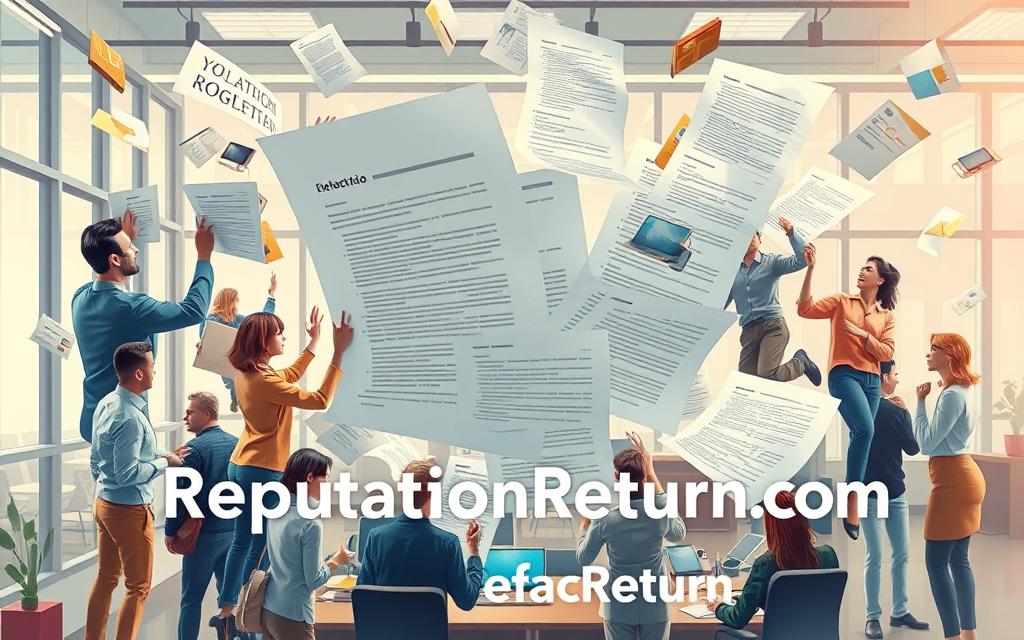Running a business or living as a citizen means you might face legal action. In the past, hiding this fact was hard. But now, the internet makes it easy to find legal records with a simple Google search. Legal records can now easily be found online.
This can hurt your personal and business reputations. Most people think the worst when they see legal results with your name. Trying to remove this info from search engines is hard and often fails.
Legal case records often top the search results for small businesses or individuals with little info. They have a high SEO weight and are on reputable government or civil sites. Google only removes content under certain conditions, like malware or scams.
Google also needs a valid court order to remove content that breaks the law. This is through its Legal Removal Request system.
Understanding the Challenges of Legal Records on Search Engines
Legal action records can really hurt your personal and business reputations. When legal results show up with your name, people often think the worst, even if the case was later dropped or you won. This is because legal records are on big, trusted government or civil websites. These sites are well-known and have a lot of SEO power.
So, legal records beat out smaller personal or business sites in search results. This means they show up first when you search for something.
The Impact of Legal Records on Personal and Business Reputations
Having legal records in search results can really hurt your reputation. Potential employers, clients, and partners may see these records as a warning sign, even if the charges were dropped or you won. This can cause you to miss out on opportunities and harm your standing in the community.
Why Legal Records Rank Highly on Search Engines
- Google sees popular legal websites as very trustworthy. This means legal records from these sites show up first in search results.
- How often people click on a link is important for Google in 2021. This affects where court records show up in search results.
- Google trusts sites that host court records a lot. This helps these records stay high in search results.
These factors make it hard to get legal records off search engines. They are deeply set in the online world. This can be a big problem for people and businesses trying to keep a good online image.
| Statistic | Value |
|---|---|
| Legislation similar to the right-to-be-forgotten laws in the EU and Argentina | The United States does not have |
| Content removal upon valid court orders | Google will remove, but court records generally not removed from search results unless the hosting site opts to delete them |
| Strategies for addressing court records ranking highly on Google | Complete removal from the hosting site or search engine suppression to push the records down to lower search result pages |
| Complexity of removing court records from search results | Can be complex and require professional assistance for effective execution |
Exploring the Feasibility of Removing Legal Records from Search Engines
Removing legal records from search engines is a tough task. You can try to ask Google to remove the content or ask the websites to take it down. But, these methods have big challenges and might not work.
Submitting Content Removal Requests to Google
Google’s rules for removing content are strict for public records and legal info. They only take down content for malware or phishing sites. They won’t remove public court records or legal documents.
Navigating Legal Removal Request Processes
Trying to get websites to remove legal records is hard. These sites are usually government or legal and want people to see the info. It takes a lot of time and effort, and you might not succeed.
Even with the hurdles, there are times you can remove legal records from search engines. It’s important to know about remove legal records from google, content removal requests for legal information, and process for legal record removal from search engines. This helps figure out if it’s possible and what steps to take.
delete legal records from search engines
Removing legal records from search engines is hard because they are public. The legal system wants everyone to see court records. Websites that have these records don’t want to take them down. Trying to get Google or the websites to remove the content often doesn’t work because the rules are strict.
Studies show that many websites share public court records online. These records can hurt your reputation and are easy to find. Even records from years ago are often online without needing to visit the court.
While you can’t fully delete legal records, there are ways to make them less visible online. Here are a few strategies:
- Expungement: This legal process removes or seals criminal records. You can get it if the crime was minor, it was a long time ago, and you’ve followed the law. Each state has its own rules for expungement, so check them out.
- Link Suppression: This means making good content to show up before bad court records in searches. You can use personal websites, social media, industry platforms, portfolios, and optimize your content.
- Record Removal Requests: Sometimes, you can get court records taken off websites. But, it depends on the website’s rules. It can take up to 60 days for them to do it.
Removing legal records is hard and can be expensive. If you need help fixing your online reputation fast, talk to reputation management experts. They can show you the best steps for your situation.

Addressing Legal Records at the Source
Trying to get legal records removed from search engines can be tough. You might want to ask the websites hosting the info to take it down. But, these sites are often government or legal, and they want people to see the records.
They won’t usually remove the info, even if you were involved in the case.
Contacting Website Hosts and Government Agencies
When you try to contact website hosts to remove legal records, it’s hard. Government and legal sites that share these records don’t have to take them down. They might not even care if the charges were dropped or erased.
Getting government agencies to hide your info is tough too. The way different states handle criminal records can make things confusing.
- Now, online arrest records are easy to find because of newspaper digitization.
- Articles about arrests can really affect people’s lives, causing job loss, relationship problems, and career issues.
- Newspapers don’t have to update or remove arrest articles, even if the charges were dropped or erased.
Removing an article from Google or other search engines can help. But, it needs to break the platform’s rules, which is hard. Creating positive online content to push down the bad stuff might be a better way in some cases.
The Expungement Option: Sealing Legal Records
If you want to remove legal records from search engines, consider the expungement process. This means asking the court to seal or erase your records from public view. It’s a detailed process that depends on your case, the laws in your area, and how long ago the incident happened.
In Maryland, you must wait 3 years for some cannabis possession charges or 10-15 years for other convictions before you can apply for expungement. You’ll need to fill out a Petition for Expungement of Records and submit it to the court. You might also need a General Waiver and Release.
Even if your records are erased, they might still be kept in legal databases. This means they could still show up in search results. But, there are ways to make these records less visible online.
Getting your records expunged and suppressed can take a lot of time and effort. It might need hundreds or thousands of hours. But for many, it’s key to improving their online reputation and protecting their future opportunities.
Remember, the rules for expungement vary a lot by state and area. It’s crucial to look into the laws in your place and might need legal advice to get through the process right.
Reputation Management Strategies
Managing the impact of legal records on your online reputation is key. The aim is to make a strong online presence. This means boosting your website and positive content so legal records are less visible.
Building an Online Presence to Outrank Legal Records
Building a strong online presence is crucial. This includes:
- Creating a professional website to show off your achievements and skills.
- Keeping up with your social media on LinkedIn, Twitter, and Facebook.
- Sharing high-quality content like blog posts or articles to show your expertise.
Sharing positive content regularly can improve your search engine rankings. This moves legal records down in search results.
Guest Posting and Link Building Techniques
Guest posting and link building are great for managing your reputation. Here’s how:
- Look for reputable websites where you can write guest posts.
- Write articles that show off your knowledge and skills.
- Get backlinks from these posts to your website or social media.
This boosts your online authority and SEO. It makes your positive content more likely to show up in search results before legal records.
| Reputation Management Technique | Description | Potential Impact |
|---|---|---|
| Building an Online Presence | Creating a professional website, maintaining active social media profiles, and creating engaging content | Increases the visibility of positive information about you, pushing down legal records in search results |
| Guest Posting and Link Building | Contributing guest posts to industry-relevant websites and securing backlinks to your own content | Enhances your online authority and search engine optimization, further suppressing legal records |
Using these strategies, you can take control of your online reputation. You can outrank legal records and protect your professional image.
Protecting Your Online Identity Moving Forward
In today’s digital world, keeping your online identity safe is crucial. Identity fraud, data breaches, and sharing sensitive info on social media are common. It’s key to be careful with what you share online to protect your reputation.
Recently, identity fraud cost the U.S. over 43 billion dollars in 2022. Data breaches are rising, with a 30-40% jump expected in 2023. Also, 25% of people share sensitive info on social media, and over 42% of websites track your online actions with cookies.
To keep your online identity safe, be careful with what you post on social media and other online places. Sharing less personal info can lower the risk of misuse or unwanted search results. Also, check your privacy settings often, use strong passwords, and turn on two-factor authentication for better security.

